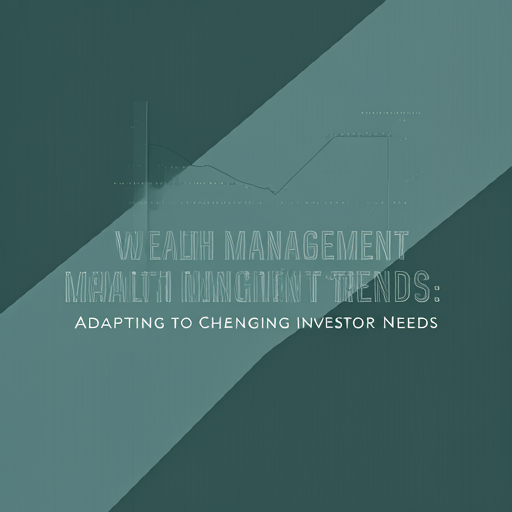Introduction to Wealth Management in the Cryptocurrency Era
The Evolution of Wealth Management
Wealth management has undergone significant transformation in recent years, particularly with the advent of cryptocurrency. This digital asset class has introduced new investment opportunities and challenges. Investors are now seeking diversified portfolios that include both traditional assets and cryptocurrencies. This shift reflects a broader trend towards embracing innovative financial instruments. The rise of blockchain technology has also facilitated greater transparency and security in transactions. Many investors appreciate these features. As a result, wealth managers must adapt their strategies to meet evolving client expectations. They need to understand the complexities of digital currencies. This is crucial for effective portfolio management. The landscape is changing rapidly. It’s an exciting time for investors.
Impact of Cryptocurrency on Traditional Wealth Management
Cryptocurrency has significantly influenced traditional wealth management practices. It has introduced new asset classes that require different strategies. Wealth managers must now consider the volatility of digital currencies. This volatility can impact overall portfolio performance. Investors are increasingly looking for diversification. They want to balance risk across various asset types.
Key considerations include:
These factors necessitate a more dynamic approach to investment. Wealth managers must stay informed about market trends. This is essential for effective decision-making. Adapting to these changes is crucial. It’s a complex landscape to navigate.
Understanding Changing Investor Demographics
Millennials and Gen Z: The New Investor Class
Millennials and Gen Z are reshaping the investment landscape. They prioritize technology and accessibility in their financial decisions. This demographic is more inclined to expend digital platforms for trading. They often seek immediate results and transparency. Traditional investment methods may not appeal to them. They value sustainability and ethical considerations in their choices.
Key characteristics include:
These factors indicate a shift in investment priorities. Understanding their motivations is essential for wealth managers. Adapting to these preferences is crucial for success. It’s a new era for investing.
Institutional Investors: A Growing Influence
Institutional investors are increasingly shaping the financial markets. Their substantial capital allows for significant influence on asset prices. This demographic includes pension funds, hedge funds, and insurance companies. They often seek diversification and risk management strategies. As a result, their interest in alternative assets, including cryptocurrencies, has surged.
Key factors include:
These elements contribute to a more favorable environment for institutional participation. Understanding their investment criteria is essential for wealth managers. Adapting strategies to align with institutional preferences is vital. It’s a pivotal moment for market dynamics.
Technological Innovations Shaping Wealth Management
Blockchain Technology and Its Implications
Blockchain technology is revolutionizing wealth management practices. Its decentralized nature enhances security and transparency in transactions. This innovation allows for real-time settlement of trades, reducing counterparty risk. Many investors appreciate these benefits. Additionally, blockchain facilitates the tokenization of assets, enabling fractional ownership. This opens new avenues for investment diversification.
Key implications include:
These features can significantly lower costs and increase efficiency. Wealth managers must understand these technological advancements. Adapting to blockchain’s capabilities is essential for future success. It’s a transformative time for the industry.
AI and Data Analytics in Investment Strategies
AI and data analytics are transforming investment strategies significantly. These technologies enable wealth managers to analyze vast datasets efficiently. By leveraging machine learning algorithms, they can identify patterns and trends that may not be immediately apparent. This enhances decision-making processes and improves portfolio performance.
Key benefits include:
These tools allow for more informed investment choices. Wealth managers can tailor strategies to individual client needs. Understanding these innovations is crucial for competitive advantage. It’s an exciting time for financial professionals.
Regulatory Landscape and Its Impact on Investors
Current Regulations Affecting Cryptocurrency Investments
Current regulations significantly impact cryptocurrency investments. Regulatory bodies are increasingly focusing on compliance and consumer protection. This scrutiny aims to mitigate risks associated with fraud and market manipulation. Investors must navigate a complex landscape of laws and guidelines.
Key regulatory aspects include:
These regulations can affect liquidity and market access. Investors should stay informed about changes in legislation. Understanding these regulations is essential for risk management. It’s a dynamic environment for cryptocurrency participants.
Future Trends in Regulation and Compliance
Future trends in regulation and compliance are likely to evolve significantly. Regulatory authorities are expected to implemegt more comprehensive frameworks. These frameworks will address the unique challenges posed by digital assets. Enhanced transparency and reporting requirements may become standard. Investors will need to adapt to these changes.
Key trends include:
These developments will impact investment strategies and risk assessments. Staying informed is crucial for investors. Understanding future regulations is essential for compliance. It’s a rapidly changing landscape.
Strategies for Adapting to Investor Needs
Personalized Investment Solutions
Personalized investment solutions are becoming increasingly essential in wealth management. These solutions cater to individual investor preferences and risk tolerances. By utilizing advanced data analytics, wealth managers can tailor strategies effectively. This approach enhances client satisfaction and engagement.
Key components include:
These elements allow for a more holistic investment experience. Investors benefit from strategies aligned with their goals. Understanding client needs is crucial for success. It’s a proactive approach to wealth management.
Education and Transparency in Cryptocurrency Investments
Education and transparency are critical in cryptocurrency investments. Investors need to understand the complexities of digital assets. Providing clear information helps build trust and confidence. Wealth managers should offer educational resources tailored to client needs. This can include webinars, articles, and one-on-one consultations.
Key strategies include:
These practices foster a more informed investor base. Transparency in fees and processes is equally important. Investors deserve clarity in their financial decisions. It’s essential for long-term relationships.

Leave a Reply